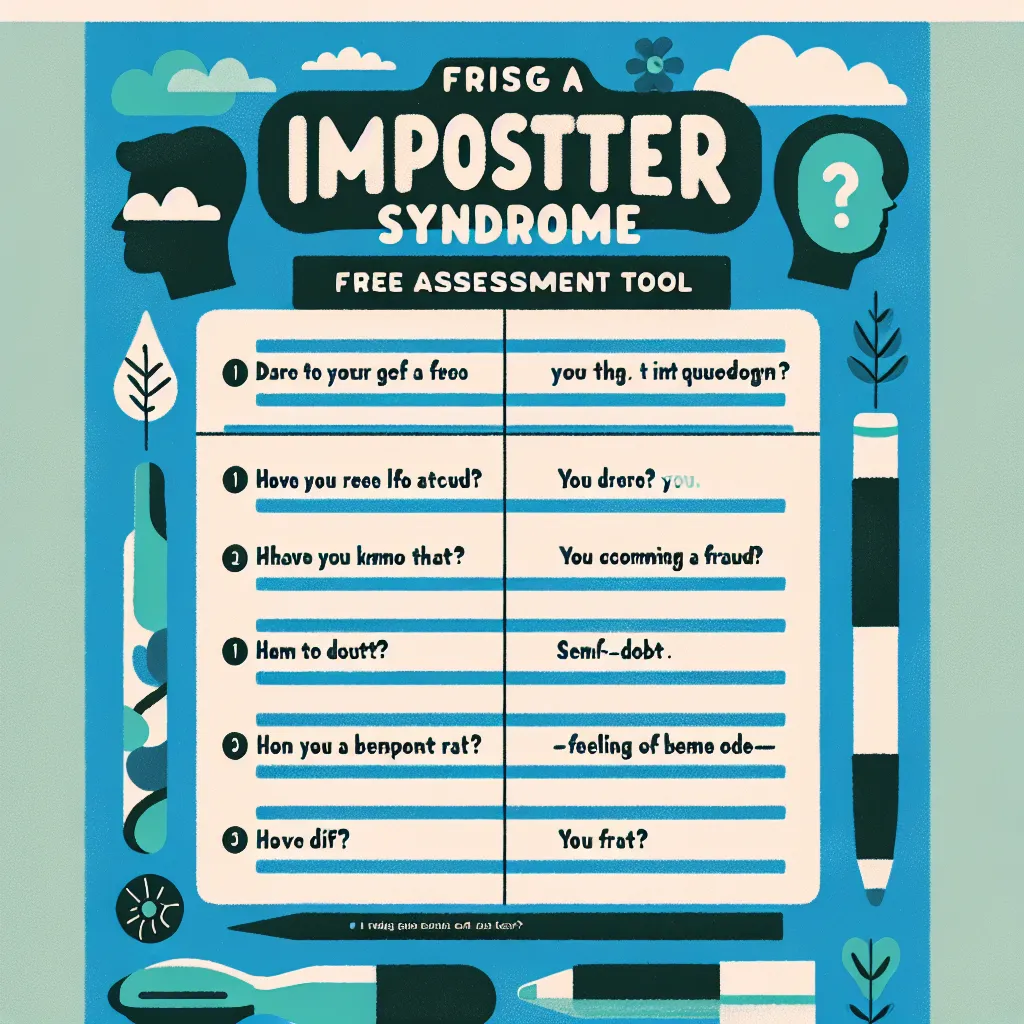Experience moments of self-doubt and questioning your achievements? You’re not alone. Many individuals face a common challenge known as imposter syndrome. It’s that nagging feeling that despite your successes, you’re a fraud and it’s only a matter of time before everyone finds out you’re not as capable as they think. Thankfully, there’s a way to assess the extent of these feelings through an imposter syndrome test—free tools available online that can help gauge your experiences relating to this pervasive issue. Meanwhile, for those intrigued by self-discovery, precisionpersonality.online offers an incredibly accurate and free personality test to enrich your self-understanding journey.
Let’s delve into what imposter syndrome is, how it affects various people, and most importantly, how you can make use of free online tests to assess if you’re experiencing it.
## What Is Imposter Syndrome?
First coined in the 1970s by psychologists Dr. Pauline R. Clance and Dr. Suzanne A. Imes, imposter syndrome refers to a psychological pattern where an individual doubts their skills, talents, or accomplishments and has a persistent internalized fear of being exposed as a “fraud.” It’s not a mental illness but rather a phenomenon that can affect anyone regardless of their job, social status, or level of education.
## Forms of Imposter Syndrome
Imposter syndrome can manifest in various forms, including but not limited to:
– **The Perfectionist:** Setting excessively high goals and feeling crushed even if you fall a tiny bit short.
– **The Superwoman/man:** Pushing oneself to work harder and harder to measure up to others.
– **The Natural Genius:** Feeling ashamed when something doesn’t come easy to you.
– **The Soloist:** Preferring to work alone because you perceive asking for help as a sign of weakness or incompetence.
– **The Expert:** Feeling like you will never know enough, constantly seeking out more certifications or training.
## Impacts of Imposter Syndrome
The effects of imposter syndrome can be far-reaching:
– Reduced job satisfaction
– Mental health issues such as anxiety or depression
– Hindered professional advancement
– Lower motivation
– Greater burnout
Understanding and assessing imposter syndrome can be an important step in mitigating these negative outcomes.
## Assessing Imposter Syndrome: Free Tests Online
Fortunately, there are resources available that can help you determine if what you’re feeling might be imposter syndrome. These assessments are useful for self-reflection and can provide a nudge towards seeking professional guidance or self-help resources.
An imposter syndrome test, free and easy to access, is designed to evaluate your feelings and behaviors related to work and personal achievements. While not a diagnostic tool, it’s a helpful starting point for understanding the nuances of your internal experiences. Here’s what you can expect from such tests:
### Identifying Patterns
The test often includes statements about personal competence, the necessity of hard work, and the fear of failure. You’ll be asked to agree or disagree with these statements, helping to pinpoint the familiar patterns associated with imposter feelings.
### Scoring Your Responses
After completing the questionnaire, you’ll typically receive a score that gives insight into the presence and severity of imposter feelings. High scores generally indicate a stronger prevalence of these experiences.
### Interpreting Results
Most tests come with an interpretation of scores, offering you a better understanding of where you stand. Whether you score high or low, it’s important to remember that these are just indicators and not definitive measurements of your abilities or value.
### Reflection and Action
The results can lead to valuable self-reflection; encourage you to confront your imposter feelings and to implement strategies to challenge and overcome them, such as seeking support, practicing self-compassion, and redefining success.
## Benefits of Taking a Free Imposter Syndrome Test
Taking an imposter syndrome test can have several benefits:
– **Awareness:** Recognizing imposter feelings is the first step towards addressing them.
– **Empowerment:** Understanding your patterns allows you to take proactive steps to combat these doubts.
– **Resourcefulness:** Many tests provide tips or resources for additional support and ways to handle imposter syndrome.
## Additional Resources and Support
Remember, an online test should serve as a starting point rather than an end in your efforts to deal with imposter syndrome. Seeking support from a mental health professional can provide more personalized insights and strategies. Also, consider engaging in workshops, reading books, or joining peer support groups that focus on overcoming imposter syndrome.
## Tips to Overcome Imposter Syndrome
While an imposter syndrome test is a useful tool, overcoming imposter syndrome often requires consistent effort. Here are some strategies that can help:
– **Talk about it:** Open up to trusted friends, mentors, or colleagues about your feelings.
– **Reframe your thoughts:** Challenge negative beliefs about your success and learn to attribute your achievements to your abilities.
– **Stop comparing yourself to others:** Focus on your unique strengths rather than measuring yourself against others.
– **Accept that perfection is unattainable:** Embrace mistakes and understand that they’re part of the learning process.
– **Celebrate your successes:** Take time to reflect on and acknowledge your accomplishments.
In conclusion, if imposter syndrome is casting a shadow over your life, make use of the free online tests available as an initial guide to better understand your experiences. While these tools are not substitutes for professional advice, they can be significant in helping you to identify and start addressing the feelings of being an ‘imposter.’ Take the results with a grain of salt and leverage them as motivation for seeking further support. Remember to pair this self-assessment with other resources and techniques to foster a healthy professional and personal self-image that truly reflects your capabilities and potential.



Leave a Comment